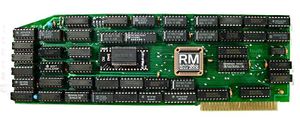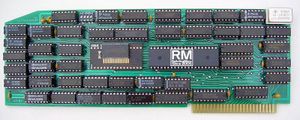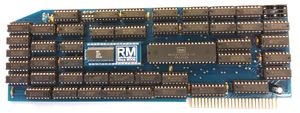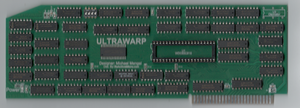UltraWarp: Difference between revisions
No edit summary |
|||
| Line 40: | Line 40: | ||
File:2017-08-04_-_ReActiveMicro_-_UltraWarp_-_v1.91RM_-_Assembled_-_Elecrow_-_Face.png|UltraWarp v1.91RM-Proto distributed by ReActiveMicro (August 2017) | File:2017-08-04_-_ReActiveMicro_-_UltraWarp_-_v1.91RM_-_Assembled_-_Elecrow_-_Face.png|UltraWarp v1.91RM-Proto distributed by ReActiveMicro (August 2017) | ||
</gallery> | </gallery> | ||
== Reviews == | |||
{{#ev:youtube|kHmOeFkWgfE|400|right|Joe Strosnider: Update - UltraWarp Review|frame}} | |||
On August 31, 2017 [[Joe_Strosnider|Joe Strosnider]] posted an update to his original UltraWarp review. He now states the board is working 100% for all his testing at 13MHz.<br> | |||
{{#ev:youtube|Y1oef1NkE4M|400|right|Joe Strosnider: UltraWarp v1.91G Review|frame}} | |||
On July 28th, 2017 [[Joe_Strosnider|Joe Strosnider]] reviews the UltraWarp v1.91G proto from ReActiveMicro. During his testing he found some issues at 13MHz which were later addressed in the production models. The card however worked fine at 12MHz.<br> | |||
== Controlling Speed == | == Controlling Speed == | ||
Revision as of 06:52, 7 September 2017
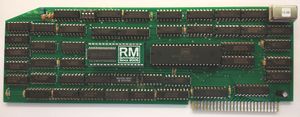
The UltraWarp is an accelerator board for the Apple II, II+, and IIe systems. It was conceived, created, and designed by Michael Mengel.
The name "UltraWarp" was trademarked by Michael on November 4th, 2010. US Serial Number:85168787, US Registration Number:4214564.
ReActiveMicro worked together with Michael to help bring the project to the Apple II Community, and was released for sale from the ReActiveMicro Store on June 13, 2017.
Project Status: Complete. In production. Actively sold by ReActiveMicro.
Support: Post on the Discussion page (link above) or email ReActiveMicro Support.
Sales: Visit the ReActiveMicro Store.
History
Michael Mengel stated "Originally I designed the card on an Apple II+ and BASIS 108 to accelerate my favorite programs CHESS and CHECKERS, inspired by an article in creative computing 1982 ("New Processors for The Apple")."
Michael has listed a few boards for sale on eBay, but never considered mass production.
On March 5th, 2017 Henry contacted Michael Mengel about helping bring his project to the Apple II Community. After some email exchanges and design reviews, a initial PCB order was placed by ReActiveMicro and soon after the boards were confirmed working and released for sale in the ReActiveMicro Store.
Versions
Michael produced a couple versions of the UltraWarp board. The last and most current version was v1.91G and usually has the speed of 13MHz. Some boards however have been over clocked as much as 18MHz.
-
UltraWarp v1.90B distributed by Michael Mengel
-
UltraWarp v1.91G distributed by Michael Mengel
-
UltraWarp v1.91G IC Locations
ReActievMicro has produced several versions of the UltraWarp board. The last and most current version was v1.91G and usually has the speed of 13MHz.
In June of 2017 Henry made a relayout of the v1.91G version to move more parts to SMT which allows for a less costly assembly. This revised version was called UltraWarp v1.91RM, and 3 protos were ordered for verification of the new layout. This new design could also allow a kit version of the board to be produced and sold.
-
UltraWarp v1.91G distributed by ReActiveMicro (June 2017)
-
UltraWarp v1.91G distributed by ReActiveMicro (August 2017)
-
UltraWarp v1.91RM-Proto distributed by ReActiveMicro (August 2017)
Reviews
On August 31, 2017 Joe Strosnider posted an update to his original UltraWarp review. He now states the board is working 100% for all his testing at 13MHz.
On July 28th, 2017 Joe Strosnider reviews the UltraWarp v1.91G proto from ReActiveMicro. During his testing he found some issues at 13MHz which were later addressed in the production models. The card however worked fine at 12MHz.
Controlling Speed
Like all accelerators for the Apple II, the UltraWarp can also be controlled by softswitches.
Location:
$C05D - Low speed (1 MHz)
$C05C - High speed (set on power-up)
$C05B - Disable
The following example in Applesoft Basic will slow the UW to the 1 MHz clock rate: POKE 49245,0
Next example switches back to full speed: POKE 49244,0
There is NO need for RESET after the SLOW-POKE or FAST-POKE.
